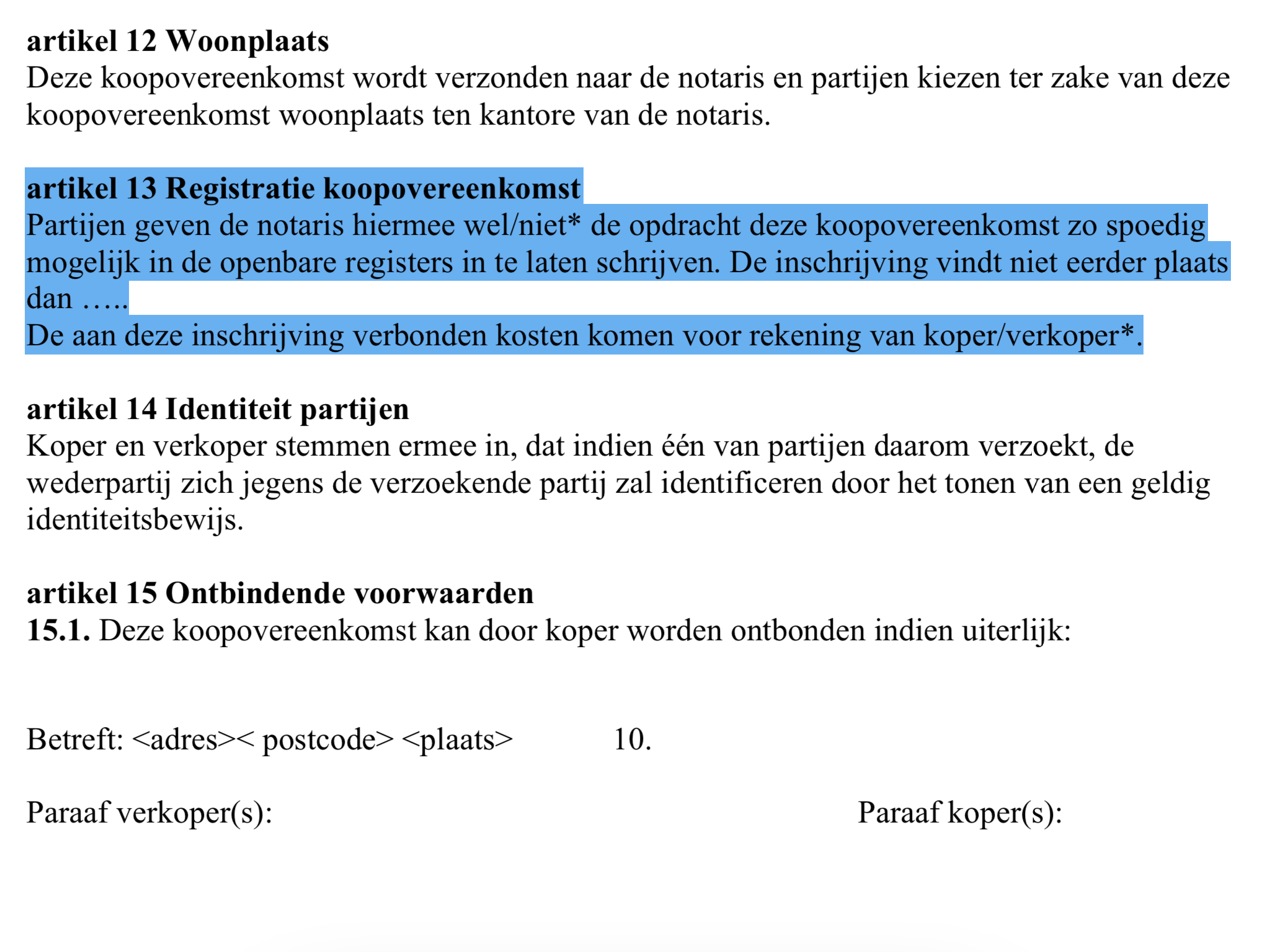Registering the purchase agreement in the Land Register: ten questions and answers
Since September 2003 registering the purchase agreement in the Land Register offers additional legal protection. This provision is sometimes called ‘Vormerkung’. When it was adopted it was expected this would become a frequent choice. However, this turns out not to be the case. If the purchase of a property is at stake it is often said that buying a jar of paint for that amount is better than choosing registration, in spite of the fact that registering offers a considerable level of protection.
- What does the registration of the purchase agreement protect against?
It protects the buyer (but it can also benefit the seller) against:
- a double sale
- an administration order
- rent or lease
- a qualitative obligation
- an attachment
- bankruptcy, suspension of payments or a debt rescheduling scheme of the seller
If the purchase agreement is registered in the Land Register and these events occur afterwards they do not affect the buyer. The purchase agreement will have to be executed as if the event does not exist for the buyer.
- Is the provision only applicable to private individuals?
No, the provision applies to every party to a purchase agreement concerning immovable property, commercial or private, consumer or non-consumer.
- Who can register the purchase agreement?
A civil-law notary registered in the Netherlands.
- How is the purchase agreement registered?
The civil-law notary draws up a deed with a copy or extract of the purchase agreement and ensures that a copy of the deed is registered in the Land Register.
- How long does the protection granted by the registration of the purchase agreement last?
Six months.
- When is the purchase agreement registered?
As soon as possible after the civil-law notary becomes aware that the buyer or the seller or both wish to have the purchase agreement registered. Or, if a specific date has been agreed on because the registration offers six months protection at most: on that date.
- Who can have the purchase agreement registered?
Both the buyer and the seller.
Even if the purchase agreement mentions that the parties do not choose to register the agreement it is still possible to register the agreement at a later stage.
This also applies when registration was chosen subject to certain conditions which have not yet been met.
In those cases a consumer who buys a property can even have the purchase agreement registered without consulting the seller about it. Indeed, the provision should never be modified to the prejudice of a buyer-consumer of a property.
- Can every purchase agreement be registered?
No.
- The immovable property must exist.
Registering the purchase agreement is not possible if an apartment right has been sold but the division in apartment rights still remains to be done. However, anticipating on this in the purchase agreement is possible. A share in land that corresponds to an apartment right that still has to be created can be sold. In that case, registering the purchase agreement is possible.
- The seller must be authorized to dispose of the property.
If, for instance, the seller is not yet the owner the purchase agreement cannot be registered.
Registration is possible if, for instance, the seller is not the only owner but has been granted an authorization from the district court to convey the immovable property to someone else autonomously.
- Registration of the purchase agreement is not possible if a purchase agreement with the same parties was registered in the six previous months.
- In the event a consumer is purchasing a property the purchase agreement can only be registered during the cooling off-period if the purchase agreement has been drawn up and co-signed by a civil-law notary registered in the Netherlands.
- Does registration of the purchase agreement also entail protection against a preferential right from a municipality?
Not necessarily.
A registration regarding the Municipalities Preferential Rights Act (‘Wet Voorkeursrecht Gemeenten’, ‘WVG’) is another provision, which is subject to other conditions than the Vormerkung.
If the conditions for a WVG-registration and those for a Vormerkung are met the civil-law notary can include them both in one deed.
In that case the registration of the purchase agreement before a designation from the municipality does offer protection against the preferential right of the municipality.
- How much does the registration of a purchase agreement cost?
The fee of the Land Register changes on a periodic basis. The civil-law notary is free to determine his fee.
You should expect to pay a few hundred Euro’s on average.
Please feel free to contact me for more information on this topic.

